The details of Bhishmadev’s life are found in Mahabharata. There is intimate relationship between Mahabharata and Srimad Bhagavatam. Mahabharata is history of greater India whereas Srimad Bhagavatam is descriptions of Krishna and His various incarnations, along with Their devotees. Krishna is the principle personality in Mahabharata. The distinction is this: in Mahabharata the emphasis is primarily upon ethics — how to lead your life in this world in a moral and ethical way in relation to Krishna. The approach of the Srimad Bhagavatam is Bhagavat-dharma — the essential importance of filling your life with hearing and chanting and becoming fixed upon the Personality of Godhead, which is the goal of life. Our discussion will be more centred on Srimad Bhagavatam even though illuminated by some details from Mahabharata.
Chapter 9 of Canto 1 has several major and distinct sections. The first section is the great souls honoring Bhishmadeva on the battle field, as he lies on his bed of arrows. Krishna accompanies the Pandavas as they all go pay their respects to Bhishmadeva, along with many sages. The second section is Bhishmadeva pacifying Yudhisthira. The third section is Yudhisthira’s questions and Bhishmadev answers regarding the duties of a king. The final section details Bhishmadev passing. Most of this seminar will be focused upon Bhismadeva’s instructions to pacify Yudhisthira & his instructions describing the duties of the king. They are very very wonderful instructions!
[SB 1.9 Text 1]
suta uvaca
iti bhitah praja-drohat
sarva-dharma-vivitsaya
tato vinasanam pragad
yatra deva-vrato ’patat
Chapter nine begins with Suta Goswami narrating to the sages of Naimisaranya headed by Saunaka Rsi about Yudhisthira’s lamentation for having killed so many soldiers on the battle field of Kurukshetra, Maharaj Yudhisthira went to see the scene of massacre. There Bhishmadeva was lying on a bed of arrows about to pass away. The scene has been set this way at the beginning of the chapter. Some days had passed after the battle was over. Yudhisthira had been installed on the throne. By Krishna’s arrangement the Pandavas all visit Bhishmadeva in their royal attire, riding upon royal chariots. This was exactly what Bhishmadeva wanted all along! He wanted Yudhisthira to become the king! Now that this aspiration has been fulfilled, Bhismadeva was deeply contented. Despite the terribly painful condition that Grandfather Bhisma was in, Krishna’s plan was to pacify and enthuse him.
Specifically stated in the purport are the reasons why Krishna accompanied the Pandavas. The purport first gives the summary of the whole chapter. “In this ninth chapter, as it is willed by Lord Sri Krishna, Bhismadeva will impart instructions to King Yudhisthira on the subject of occupational duties.” The next sentence gives the first reason why Krishna accompanied the Pandavas. Bhishmadeva could easily have instructed Yudhisthira without the presence of Krishna. However, Krishna preferred his devotee Bhismadeva do this in His presence, thus directly honoring him. “Bhishmadeva will also offer his last prayer to The Lord on the verge of passing away from this mortal world and thus become liberated from the bondage of further material engagements.” To satisfy the desire of His dear devotee Bhishmadev, Krishna personally came.
The scene of Bhisma’s passing is very similar to Haridas Thakur’s request to Caitanya Mahaprabhu –” I don’t want to see your departure pastime. You will be departing from this world soon. I only request of you one thing. I would like to leave this world before you do, and as I leave this world I want to see your beautiful face and I want you to put your foot upon my chest, and I want to leave this body calling out your name Sri Krishna Caitanya.” The passing of grandfather Bhisma was in the very same mood of love. Knowing Bhisma’s unspoken desire to see the beautiful lotus face of Lord Krishna upon his departure from his mortal coil, Krishna personally came to satisfy the desire of Bhisma so that he could give up his body in that condition. Bhismadeva was endowed with the power of leaving this material body at will and lying down on the bed of arrows was his own choice. Bhishmadeva was so detached from his body that he chose to tell the Pandavas how he could be defeated, when they approached with that very question. Otherwise it was looking pretty grim for the Pandavas. As long as grandfather Bhisma remained on the battlefield, the Pandavas could not be victorious. One evening they went to the tent of grandfather Bhisma. With folded hands they asked him “How can we kill you? Can you disclose how it can be done?” Bhisma then narrated a very intricate history involving Amba’s determination to seek revenge for how she viewed what she considered to be a grievous wrongdoing of Bhisma, ending with “If Sikandi leads the Pandava’s army then I am not going to fight because she was a woman in this life before becoming a man.”
The passing away of such a great hero and warrior attracted the attention of all the contemporary elites! All of them assembled there to show their feelings of love, respect and affection for this great soul. Krishna also wanted to show his love and affection for grandfather Bhisma – despite the fact that he fought on the side of the Kauravas, despite the fact that granfather Bhisma took a vow to kill Arjuna and the Pandavas, and despite the fact that he did not defend Draupadi. Despite seeming discrepancies in his character, Krishna accepted Grandfather Bhisma as a most wonderful and deeply loved devotee. Krishna wanted to demonstrate to grandfather Bhisma and to the world His love and affection for him.
[SB 1.9 Text 2]
tada te bhratarah sarve
sadasvaih svarna-bhusitaih
anvagacchan rathair vipra
vyasa-dhaumyadayas tatha
“At that time, Yudhisthira’s four brothers followed him, on beautiful chariots drawn by first class horses decorated with golden ornaments. With them were Vyasa and rishis like Daumya, the learned priest of the Pandavas, and others.”
[SB 1.9 Text 3]
bhagavan api viprarse
rathena sa-dhananjayah
sa tair vyarocata nrpah
kuvera iva guhyakaih
“O sage amongst the Brahmanas! Lord Sri Krishna, the personality of Godhead, also followed, seated on a chariot with Arjuna. Thus King Yudhisthira appeared very aristocratic, like Kuvera surrounded by his companions, the Guhyakas.”
Here the third reason is given why Krishna personally came. Lord Sri Krishna wanted the Pandavas to be present before Bhismadeva in their most aristocratic grandeur so that he might be pleased to see them happy, at the time of his death. In the absence of their father, Bhismadeva performed the affectionate duties of a father, in his capacity as the grandfather of the Pandavas. Just as the grandfather or father wants to see the success of his grandson or son, Krishna wanted Bhismadeva to see the success of the Pandavas. Not only was it justice that they rule; even more so, Bhisma had great affection for the Pandavas. He was a great devotee of Krishna, and they were also great devotees. He was highly virtuous and they were also highly virtuous. They perfectly resonated in spirit. Even though Duryodhana was also like a grandson, he was not a devotee and was the opposite of virtuous. So Bhisma he was partial to the Pandavas, compared to the Kauravas. He already knew that the Pandavas were victorious. However, Bhisma’s seeing them in full aristocratic, kingly opulence was deliberately orchestrated by Krishna for the deep satisfaction of Bhishmadeva. Krishna wanted it that way. To reach the battlefield where Bhisma lay on a bed of arrows, Krishna wanted to take the position of being junior to Yudhisthira considering him as his elder cousin and so He literally followed him in the procession to greet Bhisma, as He had done in many other circumstances.
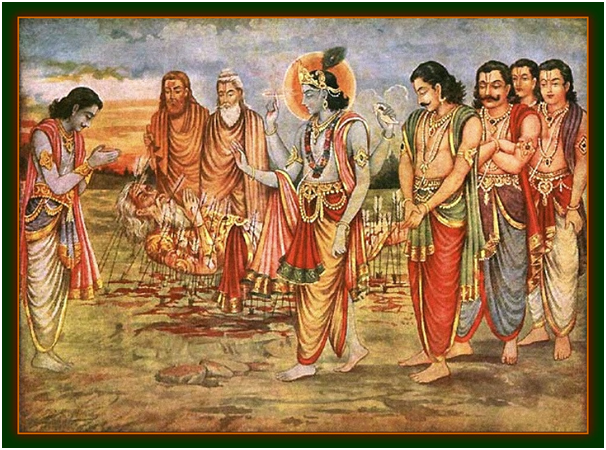
Pandavas and Krishna offering obeisance’s to Bishmadev
Each of the three reasons why Krishna accompanied the Pandavas demonstrate His sublime qualities. We should pay attention to Krishna’s exalted qualities. They are impetuses for ecstatic love for Him! Krishna has an extremely personal loving nature. He does what He does because of His loving nature. With His devotees Krishna especially exhibits His personal loving nature. With the extremely elevated devotees like Bhishmadeva and the Pandavas we find incredible exchanges — very very personal loving reciprocation! Krishna does what He does because it is pleasing to His devotees. Krishna does what He does because it brings happiness to His devotees. Krishna does because it brings honour and appreciation and respect to His devotees. Krishna likes that. He is very personal. He reciprocates with the love of His devotees, any person who is serving Him. The application point in our lives is simple: when we are doing the services that we do, we should understand and bear in mind the nature of our master. In a lecture which I attended in New York Srila Prabhupada described this quality of Krishna in resounding tones. He was quite dramatic. His tone of voice went up, and up and up…,and up! He said “Krishna is not ungrateful. Any service that anyone does, if they come to the temple and if they render even some small service, even if they just turn one screw, Krishna will never forget the service that soul has rendered.” The temple room burst out ‘ ‘Haribol! Prabhupada continued: “Krishna notices whatever service, every little service that we do, Krishna notices and Krishna never forgets. To bind ourselves to Krishna and Krishna to us is devotional service.”
Once Caitanya Mahaprabhu said to Vasudev Datta,”You have purchased me with your qualities. I declare it to everyone, I am Vasudev Datta’s man. He can sell me in the market place for whatever price he likes. Do not believe otherwise. Please understand, I am Vasudev Datta’s property.” He said it over and over again. “He can sell me at any price! I belong to him. Please don’t doubt it!” Lord Caitanya was Krishna Himself. Krishna becomes so attracted by the mood of sacrifice and service unto others and unto the Supreme Personality! One simply needs to understand the desire of the Supreme Lord then to act to fulfil the desire of the Supreme Lord. Then Krishna gives Himself. This same point is analysed by Rupa Goswami in Nectar of Devotion. Krishna can very easily give material benedictions. “You want this, you want that? Sure, no problem! Liberation? That is also available. Devotional service? That is very rare, because with pure devotional service one can purchase me, control me.”
In this world everybody is keen to control things, to possess things, to enjoy things. A devotee doesn’t care for that. He simply want to serve Krishna. That mood of wanting to serve Krishna is so powerful and rich, because Krishna places Himself at the disposal of His devotee. This was the realization of the illiterate Brahmin at Srirangam who couldn’t properly pronounce the words of Bhagavad Gita. The other Brahmanas used to laugh at him. Yet he was crying with tears of joy and love, understanding how Krishna reciprocates with the devotee so much. It is not that one can try to manipulate Krishna. When there is a genuine mood of service, you will have Krishna on your side and you will be victorious. That is Sanjaya’s conclusion in the Bhagavad-gita. “Wherever there is Arjuna and Krishna, there will surely be victory.” In life there are so many challenges. If we want to have Krishna always on our side, because we want to be with Him always, then surely victory will also be ours. Victory over illusion! “Param vijayate Sri Krishna sankirtanam.”
Among demigods Kuvera is the treasurer. He is the richest demigod. Yudhisthira’s opulence is compared to Kuvera’s. The Pandavas were living for a long time in exile, living in the forest. They were always put into difficult positions, again and again. Now the difficult situations are over. Grandfather Bhishma is very happy! That is what Krishna wanted to come before Bhisma on the battlefield. He wanted to make Bhishma happy.
The devotee wants to make Krishna happy, and Krishna wants to make the devotee happy. There is a competition, and guess who wins? Krishna wins! It makes Him happy to see His devotees happy.
[SB 1.9 Text 4]
drstva nipatitam bhumau
divas cyutam ivamaram
pranemuh pandava bhismam
sanugah saha cakrina
“Seeing Bhishma lying on the ground, like a demigod fallen from the sky, the Pandava King Yudhisthira along with his younger brothers and Lord Krishna bowed down before him.”
The Pandavas were conscious of Krishna’s position. Grandfather Bhisma was also conscious of Krishna’s position. Right in the Rajasuya Yajna he declared Krishna’s supreme position. He declared it so happily and boldly and deliberately! Sisupala became irate. Bhisma knew that Krishna was the Personality of Godhead. He wasn’t bewildered or hesitant to declare it. Krishna knew that he knew, as well. So, why was Krishna coming before Bhismadev and bowing down? Is Krishna contradicting Himself? No. He is performing a lila in which He is demonstrating by His personal conduct the standards of etiquette. When you are before an elder and senior personality you bow down, whoever you may be. Even Personality of Godhead bows down, not just in a ritualistic way but fully showing His respect. Etiquette is not merely behavior. Etiquette is much more than behavior — certain actions that we do and don’t do. Etiquette is more than that. Carry the mood of respect, while offering obeisances – in this case, Krishna to Bhishmadev. That is what Yudhisthira was feeling and what Krishna was also feeling, when bowing before grandfather Bhisma.
Krishna likes honoring His devotee! That is the nature of our master. That is our Lord. He likes performing lilas with pure unalloyed devotees who take the role of His superiors. He treats those who are His elders as His superior. He likes the affection of mother Yasoda and Nanda Maharaja. He likes it more than the revered hymns of the Vedas. Lord Brahma in the Brahma Vimohana Lila offers prayers to Krishna. These wonderful prayers are recorded in the 14th chapter of the 10th canto of the Bhagavatam. But Krishna shows disinterest. He silently waited for Brahma to finish his prayers, because He wanted to be back with the cowherd boys having lunch. He is unlimitedly more attracted to their informal confidential love. What is the application point? When we do things in sadhana bhakti, we should do them with feeling. Offering prayers, offering respects, participating in the arati – these are not merely a ritual. Yes, there are ritual components involved; but the real experience is the devotion with which we render these services. Accordingly, we will experience the reciprocation. This is very important.
Krishna is teaching by example, what is vaisnava etiquette. We should also act as vaisnavas within the society of devotees, where we have an opportunity to teach not just behavior, but the proper mood of respecting other living entities and seeing them as part and participle of Krishna, taking appropriate action and speech according to their position. This conduct alone will remind persons of Krishna. We remind devotees in one way, remind innocent people in another way and keep a safe distance from demoniac people.
[SB 1.9 Text 5]
tatra brahmarsayah sarve
devarsayas ca sattama
rajarsayas ca tatrasan
drastum bharata-pungavam
“Just to see the chief of the descendants of King Bharata [Bhīṣma], all the great souls in the universe, namely the ṛṣis amongst the demigods, brāhmaṇas and kings, all situated in the quality of goodness, were assembled there.”
The passing of grandfather Bhisma was a universal event. Visitors came from other planets to be present, just as Krishna personally came to honor the occasion, to satisfy grandfather Bhisma, to witness and bring auspiciousness to the passing of the soul of Bhisma into the spiritual realm. All of them assembled there are hearing the news of the great warrior’s impending death.
The next section starts listing some of the persons who were present: Parvata Muni, Narada, Daumya, Vyasa and so forth.
Why is it that great ṛṣis, those who instruct demigods, came from other planetary systems to witness the passing of grandfather Bhisma? Who is this personality?
Grandfather Bhisma is described as being one of the eight Vasus. In Madvacharya’s writing he describes the demigods being 33 million and the principal among the 33 millions are three categories — the sons of Aditi or the Adityas, the Vasus and the Rudras. Bhishmadeva was in the category of the eight Vasus. Parasurama was unable to defeat Bhishmadeva after fighting for a number of days. The father of Parasurama said “He is one of the Vasus, so you won’t be able to defeat him.” Let us remember: Parasurama was a lila avatara, a form of the Personality of Godhead!
How Bhishmadeva, one of the Vasus, came to earth from the heavenly planetary regions is described in Mahabharata. Once the eight Vasus and their wives were travelling about the universe and one of the places that they came to was the hermitage of Vasistha. The wife of one of the Vasus named Deo (some versions of Mahabharata give his name as Prabhasa) saw the Kamadhenu of Vasistha and wanted it. Deo listened to his wife and then discussed with the other Vasus. They decided to take Kamadhenu by force. When they did so Vasistha cursed them that they will be born on earth. The seven of them who didn’t actually do the stealing will die soon after birth and return to heaven but this Deo who actually did the stealing will have to stay long time on the earthly realm. He will exhibit the qualities of a great hero. The eighth Vasu Deo became Bhishmadeva. Bhishmadeva became the son of Santanu.
There is also an elaborate story about how Santanu was born, likewise found in Mahabharata.
There was a great King Maha Abhishek, who by service to the Supreme Lord Vishnu reached Vaikunta at the end of his life. One time from his position of a resident of Vaikunta he came to visit Brahma in Satyaloka. When he was visiting Brahma, celestial mother Ganga was also present there. A breeze came and the garments of Ganga moved to the side and Maha Abhishek became attracted in a lustful way seeing parts of Ganga’s body, and she also exchanged glances with him. Lord Brahma detected this impropriety on their part and cursed them both that they will leave the heavenly abode and their elevated position and take birth on earth. Maha Abhishek became Maharaj Santanu. Ganga became an earthly female form named Ganga. Ganga appealed to Brahma for leniency. He responded to the appeal and told Ganga that, “You remain on earth for some time. The eight Vasus will become your sons. After the eighth Vasu was born you can again return to your heavenly position.”
The father of Santanu was Prathipa, who at one time was engaged in austerities in the forest. When Gangadevi saw Prathipa, she became attracted to him. While he was doing austerities she came and sat on his left thigh and indicated that she was attracted to him. He said, “According to our culture the daughter-in-law sits on the right thigh. Therefore, my son will marry you.”
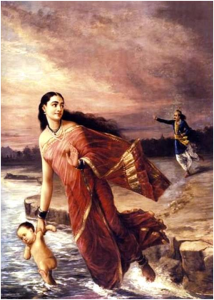
Shantunu objecting to gangadevi’s action of throwing babies into the flowing water of ganges.
When Santanu was travelling in the forest and saw Ganga he was immediately attracted to her. He courted her and requested her to become his queen. Ganga agreed to become his queen on one condition: he would never speak anything that will be disturbing to her. After some time a son was born and Ganga took the son and threw the child in the Ganges. Santanu didn’t speak anything because he had promised. This happened seven times. The seven Vasus just after their birth returned to their demigod position. Deo who had taken the Kamadhenu of Vasistha was the eighth child. When the eighth son was born Santanu spoke up. “Ganga, please don’t do this. You have killed seven of our children. Leave this one at least.” With that she invoked the promise that he had made and said she would leave. She took the eighth child and left. Poor Santanu! Seven children killed, his eighth child taken away by his dear wife!
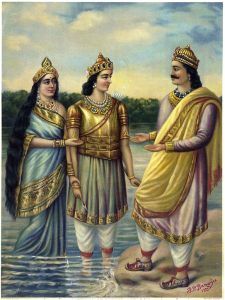
Shantunu receving Devavrata from Gangadevi
Ganga Devi then lived in the forest with Devavrata (she named the child Devavrata) for thirty two years. She and Vasistha trained Devavrata in the knowledge of the Vedas. She entrusted Devavrata to Parasurama to train him in military science or Dhanur Veda. He was thus properly trained as a Ksatriya. Thirty two years later Shantanu was again in the forest and he saw this young man. Not knowing who he was, he was attracted, but as he approached Devavrata disappeared. He searched and searched and found Ganga and pleaded with her to give him back his son. He wanted to make him his successor. Ganga gave the son to Santanu and she left back to the heavenly kingdom.
Santanu then proclaimed that his son Devavrata will be named as his successor in a public ceremony.
Shortly after that Santanu was travelling in his kingdom. He smelled a fragrance of musk very very strong. He followed that fragrance and it took him right into the house of a fisherman. He understood that the source of that fragrance was the daughter of the fisherman. He saw the beautiful girl, who was the daughter of the fisherman. He offered to marry the daughter of the fisherman. The fisherman did not yield right away even though that would make her the queen of the whole kingdom. He did not yield right away because his daughter Satyavati had received a special benediction from Parasara Muni that her son will become king. So he was playing his cards closely.
Now who was Satyavati?
Mahabharata describes as follows. Satyavati was a heavenly damsel who had been cursed to leave the heavenly realms and to take birth on earth as a fish. The celestial maiden was Adrika. Adrika became a fish by curse. There was one king Upavrichavasu. His semen somehow fell into the Ganga and the fish swallowed it and two humans were conceived in the body of the fish. A fisherman caught the fish and when he opened up the fish and looked inside much to his surprise there was a young boy and a young girl in the belly of the fish. He was so astonished! He gave the young boy and the young girl to the king. The king decided that he would accept the young boy to become the successor king of the Matsya province. The daughter had bad fishy smell so he named her Matsyagandi. He gave her back to the fisherman. The fisherman raised Matsyagandi. He was a pious man. He thought that one thing can benefit my daughter. If she is offering the service of a boat conveyor across the river one day she may get the blessing of some sage.
One day Parasara Muni was crossing the river. He got in the boat of Matsyagandi. As he was crossing the river he was doing an astrological calculation. Parasura Muni calculated that at that very moment of time an incarnation of the Personality of Godhead will appear. In order not to lose the moment, the window of opportunity, that auspicious moment, he requested the young girl Matsyagandi to be the bearer of that child. He would be the father and she would be the mother. She said, “How can I do that? I am not married.” He said, “Don’t worry. This can be arranged in such a way that you won’t lose your virginity.” She asked “If I am carrying a child for nine months then everyone is going to see that.” He reassured her saying “Don’t worry. This child will be born in such a way that just after pregnancy a mature child will be born. He will also very quickly grow into an adult form.” She then said “But we are in the middle of the river. Everyone can see in all directions.” He replied “Don’t worry. I will create an island and put a mystical fog all around. No one will be able to see.” So she agreed, understanding there was a divine purpose in all this. So Parasara conceived Vyasa in the womb of Matsyagandi, and when Vyasadeva was born Parasara departed from her after giving her benedictions for accepting the service. “Your fishy smell will become very very fragrant like musk, you will become very beautiful, and your son, born of you after Vyasa, will become King.” She was very happy.
When Vyasa was born he became adult stature and he left. Before leaving he told her. “My dear mother, if you just remember me at any point in time I will come and assist you in whatever it is that you require.” She evoked that benediction later.
Matsyagandi went home and narrated all these happenings to her father. He accepted what she said, due to the heavenly musk fragrance of her body.
Now going back to Santanu. When he requested the fisherman to marry his daughter, the fisherman replied, “Well, that will be possible because my daughter should have as her son the next King.” Santanu said “How is that possible? My son Devavrata is the Prince regent. He is my first born son. He is lawfully the incumbent king.” The fisherman said “I am sorry. You can’t marry my daughter.” So Santanu went back to the palace very unhappy. Mahabharata describes he just went to bed and could not get out of bed. He was very unhappy! The entire palace and the whole royal family could understand that something was wrong with Santanu. Devavrata asked the sages, the ministers of the king’s court, and they informed him what happened. Without any further consideration Devavrata immediately went to the house of the fisherman and personally made the appeal on behalf of his father. The fisherman told him “I am sorry. I already told Santanu that the answer is no.”
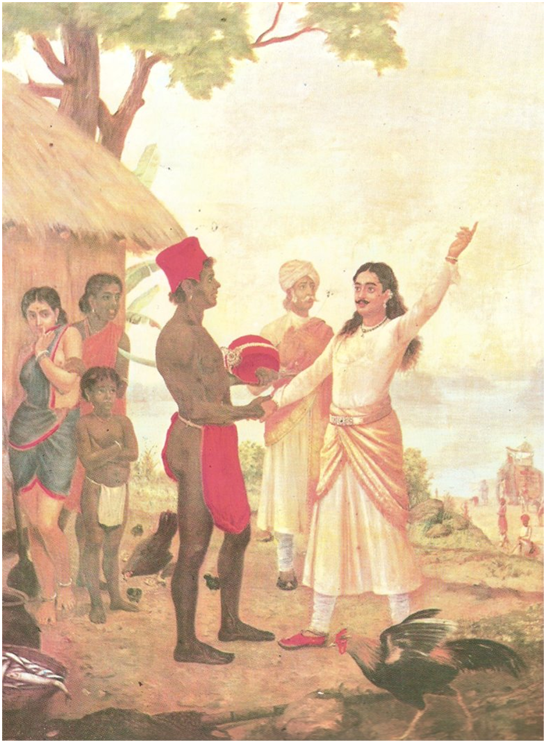
Devavrata taking his celibate wow and renouncing the kingdom, earning him the name Bishma
“Why not?” asked Devavrata. He replied “My daughter should have as her son the next king.” Devavrata said “No problem. I am supposed to be the king. I hereby take a vow that I will not become king.”
“Well, that is good, but not good enough. Supposing you get married. Although you are not king and you have a son who is born first; that son will become the king and my daughter’s son will not become king.” So Devavrata stood up and said “Then I take a second vow. I will never become married.” The fisherman said “Very well. Right now I give you my daughter. You can take her to Santanu and she can become his queen.”
Showers of flowers came from the sky and the resounding sound “Bhisma! Bhisma!” for his taking such a strong vow. That is how Devavrata became Bhisma. When the daughter was presented to Santanu, in a totally despondent state lying in bed, he was so amazed! When Santanu knew how she came to be there, he gave a benediction to his son that he will die only when he wanted to. Santanu must have been very powerful to give such a benediction to his son.
So Bhisma was the eighth Vasu. Santanu was previously Maha Abhishek. Both father and son had descended from heavenly situation.
Bhisma was now in a position when he was already expertly trained in military skill. He was learned in the arts of Vedas. He was qualified as a Ksatriya, but he would not get married and he would not become king. He stayed with the royal family and he was cared for as a member of the royal family. Grandfather Bhisma made so many arrangements for the entire royal family. He arranged the marriages of both Dhrtarastra and Pandu. He arranged the marriage of Vicitravirya. He was always in service to the royal family. This picture helps to understand why he was in service to the Kauravas. As he was maintained by the royal family, by religious principles he was duty-bound to serve the royal family, and Bhisma was a man of duty. He was a man of virtue. He did things because they were to be done. He stood on that firmly. That is the morality part of Mahabharata. The higher principle is he was a devotee of Krishna. One can be a moralist for Krishna or one can just be a moralist. It is possible to be a “moralist atheist”, a follower of the rules of Varna and ashram for the sake of material elevation and not for the sake of satisfying Krishna. Bhisma’s life was for satisfying Krishna. Whatever he did it was for satisfying Krishna because he was a great devotee. As he was a great devotee, Krishna reciprocated with that devotion. That is our Master, Lord Krishna!
I will share just a little bit more from Mahabharata. In the verse that we just read, Text 5, Suta said, “Just to see the chief of descendent of King Bharat i.e. Bhishmadeva…” Bhishmadev was in the line of the kings from Bharat Maharaja. There is an interesting long detailed genealogy of the family line of Bhishmadeva. In that family line of Bhishmadeva we find Puru and Yadu before Bharat. After Bharat comes Kuru. So Bhismadeva is in the Kuru dynasty, who was a descendent of Bharat, just like Yudhisthira, Arjuna, etc. The Kuru dynasty goes like this: Vishnu, Brahma, Atri then Chandra. What follows from there is the moon dynasty of Kings. The dynasty in which Krishna appeared is the Lunar dynasty. The dynasty in which Ramacandra appeared was the Solar dynasty.
Bhisma was the son of Santanu and Ganga, but had no sons, so that Satyavati’s son would become the king. Through Satyavati two sons were born who were destined to inherit the throne. Those two sons were Victravirya and Citrangada. When the elder brother Citrangada was just a boy he was crowned the king. Shortly after he was crowned Santanu died. While Citrangada was still a young fellow there was a Gandharva of the same name, who was really arrogant and proud. He wanted to know “Who is this imposter Citrangada who is claiming to be the emperor of the whole world.” He came and declared war against the young Citrangada. The battle lasted for a year and the young Citrangada was killed, leaving Vicitravirya the second son of Santanu and Satyavati to become the king.
There was no queen for Vichitravirya.
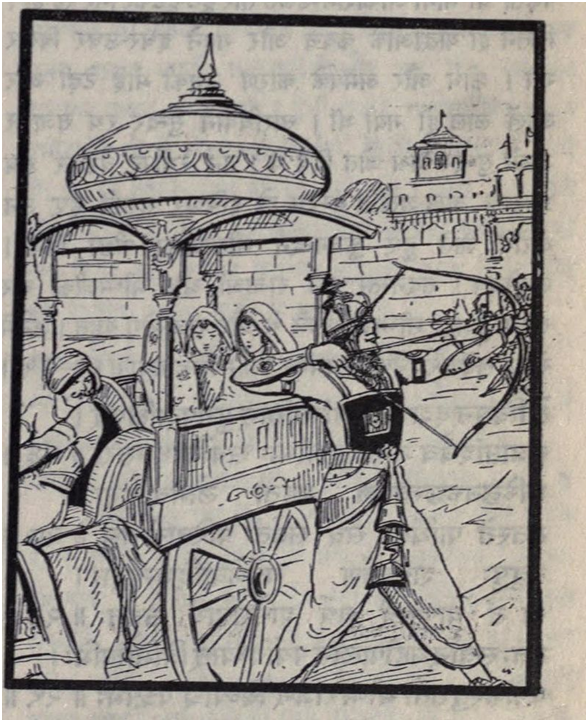
Bishma winning over the daughters of king Kashi
Meanwhile there was an announcement of the svayamvara ceremony of the daughters of the King of Kasi. So the elder brahmacari Bhisma went to take part in the svayamvara ceremony. The other kings were objecting. Bhisma said “I have not come here for my marriage but for the marriage of Vicitravirya.” In Mahabharata Bhisma gives a detailed narration on eight different categories of marriage. After the narration he said “I am going to take all three daughters. If anyone wants to fight me, go ahead.” The kings fought with Bhisma and Bhisma defeated all the kings including Salva and took all the three daughters to Hastinapur to wed Vicitravirya. Just before the marriage was to take place Amba confided in Bhisma that she couldn’t go through that marriage because she had already given her heart to Salva. So Bhisma sent her back to King Salva. But Salva refused to marry her saying that she was touched by another man and so he couldn’t accept her and sent her back again. Amba went back to Hastinapur. Vicitravirya also didn’t want to marry her as she had given her heart to somebody else. Now Bhisma didn’t know what to do! The Brahmanas suggested that he should marry her as he was the one who touched her. Bhisma couldn’t do that as he had taken a vow not to marry. Amba went to the sages. She thought that it was her misfortune that she could not marry the man that she wanted to marry and now she could not marry the man that she was supposed to marry either. She wanted to go to the forest and become a mendicant for purification. The sages told her to go to Parasurama, as he was the spiritual master of Bhisma. They said that if she went to Parasurama to plead her case then he might insist on Bhisma’s marrying her. She went to Parasurama and told him everything. He said he will speak to his disciple.
The discussion between Bhisma and Parasurama took place. It is very important and instructive. Parasurama asked Bhisma “Why are you doing like this? You kidnapped the girl from her svayamvara ceremony and now you are refusing to marry her.” “I didn’t kidnap her for myself. It was for Vicitravirya. But she said she couldn’t marry Vicitravirya because she had given her heart to Salva. Salva won’t accept her so I don’t know what to do.”
“You should marry her.”
“How can I marry her? I had taken a vow not to marry.”
Parasuram became angry. He said “I have given you an instruction. Either you marry her or you fight me.”
Then Bhisma said “In scriptures there are three principal reasons or conditions when a disciple may not take the instruction of the spiritual master. One of them is when the spiritual master is corrupt in his standards of morality and religious principle. Another is when he becomes overly proud or vain. Another is when the instructions are directly contrary to religious principle. I have taken a vow and you are asking me to break the vow which is directly contrary to religious principle. I can’t break my vow. I am bound to my vows. We will have a fight. Let the place for the fight be Kuruksetra. The Ganga flows by the side of Kuruksetra. Where the Ganga flows it is beneficial. When you die they will place your body in the Ganga.”
When they reached Kuruksetra Ganga pleaded with both Parasurama and Bhisma “Please don’t go through with this” but they were determined. At the beginning Bhismadeva asked permission from Parasurama for the battle and Parasurama gave his permission. The fighting took place for thirty days! Sometimes it appeared as if Bhismadeva will win and some days it appeared that Parasurama would win. They were both equally powerful!
One evening the Vasus appeared in the dream of Bhismadeva. They said “We are going to give you a special weapon. With this very special weapon you will be able to defeat Parasurama” They gave him the weapon. Naradha came and told him the next morning not to use it.
The father of Parasurama came the next morning to Parasurama and said “Just surrender. Just give up fighting. You will not be able to defeat him.”
At the very beginning of the day’s battle Parasurama dropped his weapons. Bhisma then came and put his head at Parasurama’s feet. The battle was over.
Parasurama went and informed Amba “Sorry. I couldn’t defeat my own disciple. I don’t know what to tell you.”
She decided to go to the forest and perform austerities to destroy Bhisma. She underwent very severe austerities for years. She became emaciated. At one point Mother Ganga came and spoke to her, “What mentality is this? These intense severe austerities so that you can destroy another? Half of your body will become a river.” Even then she continued – determined, determined, determined. Finally Lord Siva came and asked her desire. She said “I want to destroy Bhisma.”
Lord Siva said “I can make an arrangement. When you die you will take birth again in a woman’s body but later that woman’s body will be transformed into a man’s body and in that man’ s body you will be able to destroy Bhisma.”
She jumped into the fire and died. Later on she was born as Sikandi. Bhismadeva disclosed this whole history to the Pandavas when they asked their grandfather how he could be defeated. Since Shikandi fought with the army of the Pandavas, Bhisma said “Put Sikandi in the front line of your army. I will not fight because I will not fight a woman. I will drop my weapons and then you can kill me.”
Bhismadeva had an impeccable moral side, an incredible personality who stood up for virtue, very much like Yudhisthira. Naturally, there was very strong affinity between the two.
So much of what Bhismadeva taught was in terms of morality. This is one of dozens and dozens of occasions when Bhismadeva gave moral instruction in Mahabharata. Vidura, Bhisma and Yudhisthira all gave volumes of moral instruction in Mahabharata. There is so much moral instruction in Mahabharata!
The emphasis in Srimad Bhagavatam, however, is upon attachment to the lotus feet of Krishna. It is not that it is absent in Mahabharata, nor visa-versa. In the 5th and 6th chapter of first canto of Srimad Bhagavatam Vyas is lamenting. He is feeling despondent even after completed all of the Vedas which include Mahabharata. Why the despondency? The answer is given by Narada. “You didn’t do anything wrong but you gave inordinate emphasis to all those things which can elevate the soul to a higher planetary situation, a situation of piety in the heavenly realms. But you have not sufficiently given emphasis upon the Personality of Godhead and becoming fixed at His lotus feet.” That is what Srimad Bhagavatam is doing. There is the contrasting picture between the two scriptures.
Here is a little section from Santi Parva of Mahabharata. Yudhisthira is asking Bhismadeva “How can a living entity become free from miseries?” That is a nice question!
“Respected grandfather, in this material world the conditioned souls are facing so many difficulties. Please tell me how they can be freed from all miseries.”
Bhishmadeva replied “My dear king, the following people are free from miseries.” There is a list of 44 such persons. First, the Brahmana who has controlled his mind by following scriptural regulations of four ashrams and behaves in accordance with such regulations. Two- one who is not envious can become free from miseries in this world. Three- the one who is very regulated. Four- one who controls his material desires. Five- the one who does not react to another’s harsh speech. Six- the one who does not physically retaliate with an aggressor. Seven- the one who always gives but never asks for anything. Eight the one who gives shelter to guests. Nine the one who never criticizes. Ten- the one who studies Shastra regularly –mode of goodness. Eleven- the one who knows scriptural quotes. The one who always serves his parents. The one who does not sleep in the day time. The one who is free from the sins of mind, speech and actions. The one who never troubles any living entity. The king who is not greedy for the wealth of his citizens. The king who always protects his countrymen from invasion from all directions. Eighteen – the one who never commits illicit sex. Nineteen- the soldier, never fearing death, who always fights according to Sastra to win. Twenty the one who never lies even when his life is at stake etc. There are 44 items. These are all moral instructions. The instructions that we receive in the Bhagavatam and in Caitanya Mahaprabhu’s teaching is sravanam- kirtanam-Visnu: hearing and chanting the glories of the Personality of Godhead. Bhagavat-dharma is the emphasis in Srimad Bhagavatam. Framing a god-centred life around principles of morality and codes of ethics and self control and selflessness and quality of goodness is Mahabharata. The presenters of such conclusions include Bhisma, Vidhura, Yudhistira and Brahmanas. The consequences for those who do not live their lives according to those principles — that is in Mahabharata also.
We will continue tomorrow morning. Hare Krishna!

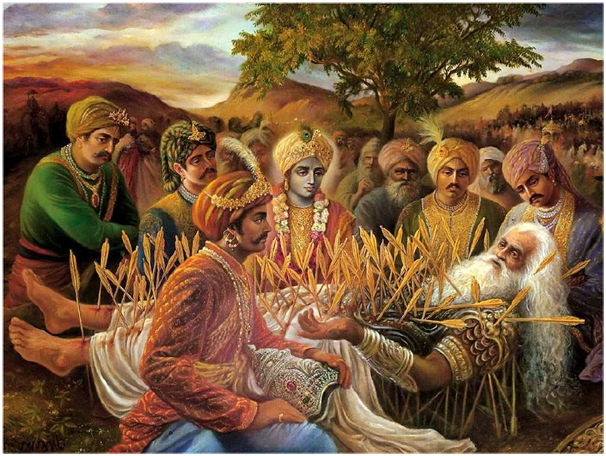

Such a wonderful description of Bhismadev’s glories, the Lord’s reciprocation, and the difference or similarity between Mahabharata and Srimad Bhagavatam!
A beautiful expose of what Devotional Service IS:
“To bind ourselves to Krishna and Krishna to us is devotional service”.
Thank you for the article.
Great blog that I enjoyed reading.